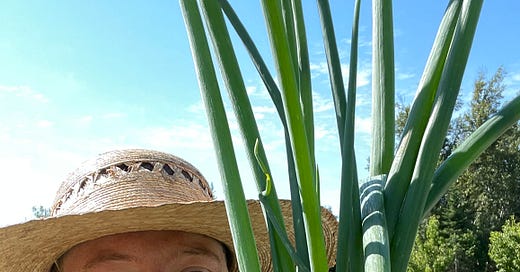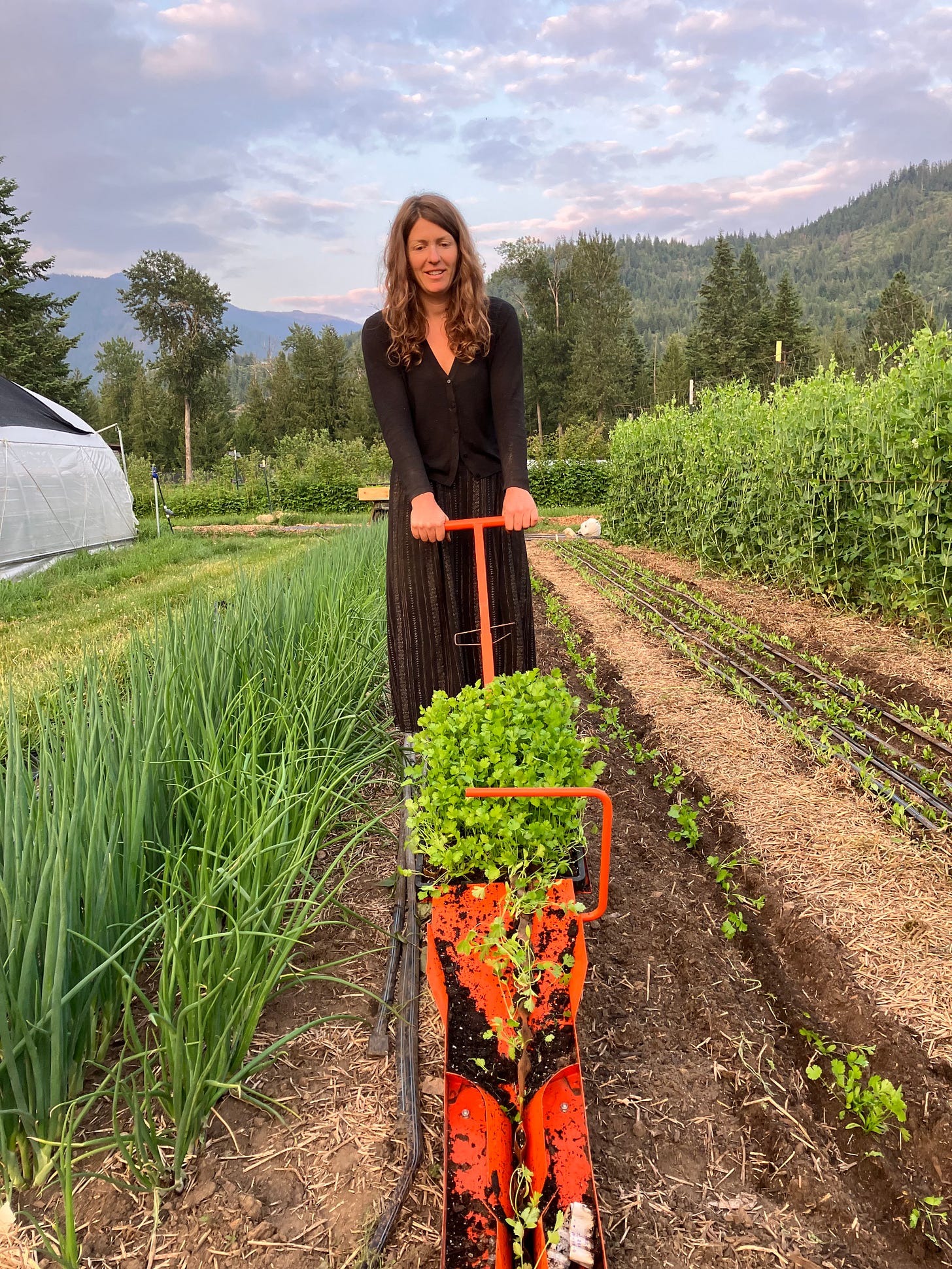My friend Emma is visiting this week. She runs Mountain Cloud Farm an all-women’s organic vegetable farm in Idaho. The produce she brought with her has been amazing.
Last night we were cooking up food that she grew herself: baby bok choy, onions, garlic, ground beef and it occurred to me how little time it takes to eat the food that it took so long to grow. So I asked Emma about what it takes to grow food:
Most veggies are in the greenhouse for a month in starts
They then get transplanted into the ground
Lettuce and baby spinach take about a month
Cauliflower and broccoli take about two months
Carrots take up to three months
Harvesting and processing take about a day
Within 24 hours, the food is sold through the CSA or at the Sandpoint farmers market.
So a rough summary of our food system:
It takes three months to grow food (in industrial “farms,” chickens are slaughtered around two months, cows about 1-2 years, living terrible lives).
It takes one day to harvest and one day to ship (industrial food probably more).
It takes about 30 minutes to cook.
We shovel it into our mouths in about 15 minutes.
This is why every wisdom tradition offers gratitude before meals to acknowledge the source of our food, the labor it took to grow it, and how it nourishes our bodies. It’s super easy to get entitled to food if you think it just appears magically on the dinner table.
It takes months, maybe years, to grow food and minutes to eat it.
Slow eating
This is a well-known Zen meditation, typically done with a raisin. Take about 5 minutes for this exercise.
Take a piece of food and hold it in your hand. Gaze at it with care and full attention, like you’ve never seen it before. Notice details you’ve never paid attention to before.
Feel it between your fingers, exploring its texture. Bring it to your nose and notice the smell, aroma, or fragrance. Notice anything happening to your mouth and stomach when you do this.
Place it on your lips and then take it in, focusing on the sensations of having it in your mouth, exploring it with your tongue.
When you are ready, prepare to chew, noticing how and where it needs to be for chewing. Then, very consciously, take one or two bites into it and notice the waves of taste. Without swallowing yet, pay attention to the sensations of taste and texture in your mouth and how these may change over time, moment by moment. Also pay attention to any changes in the object itself.
Make the intention to swallow before doing so. Then, see if you can feel the food moving down into your stomach, and sense how your body as a whole feels now.
As you swallow, think of all the hands that touched this food to get to you: the farmer, the driver, the distributor, the grocer, the chef. Think about the sun, the rain, the soil. Offer a prayer of thanks to them and accept the food humbly into your body.
Attention is the source of pleasure
Every blade of grass has its Angel that bends over it and whispers, "Grow, grow." — The Talmud
Attention is the source of pleasure; you can’t enjoy something unless you give attention to it. In offering attention to what it takes to grow food, we enjoy the food more. We should remind ourselves that we live in a circle of grace, the fact that food grows as part of earth’s natural system is an everyday miracle we pay little attention to. And that’s just the first layer. After that, there is so much effort to bring sustenance to you.
It’s so easy, especially if you live in a city or suburb, cut off1 from your sources of food, to eat mindlessly, ungratefully. What would happen if the food system, the natural earth, stopped, even for a week?
It bothers me when I hear people complain about how the cost of food has gone up so much since the pandemic. If only people knew a little history. In 1901, groceries were 42% of a household budget. In 1947, it was 23%. Today, groceries are about 7% of our budget. We only think food is expensive because we’re so unaware of how the effort it took to make it. 2
We pay our farmers so little. Emma and her business partner Rose make $30k a year. Minimum wage. I’ve visited the farm; there’s a lot of hard work and care there.
They get paid so little.
Creating food is hard work. But we don’t value it because we pay so little for it
Part of it is that we equate monetary value with actual value. We think people who get paid $200k a year are doing more valuable things than people who get paid $30k a year. But I know people who make $200k a year and many are working what economist David Graeber called bullshit jobs, work that, if eliminated, would have no discernible or even positive impact on society.
Graeber estimated that half of jobs are bullshit. (Not) incidentally, marketing and advertising is a trillion dollar industry, meaning we spend a trillion dollars to “educate” people about things they were too ignorant to know they had to buy.3
You’ll never see an ad for a carrot because you don’t need to market things that people need. You’ll only see advertising for things that you don’t need, things you have to be taught to want.
Ads for Cheetos, but not chard. Ads for Ruffles, but not rhubarb. Capitalism creates disordered desire. We give attention to advertising and not to food.
We think “since food is cheap, it must be easy.”
But never equate monetary value with actual value.
It takes months to grow food and minutes to eat it. So stop a moment before your next meal to thank your farmer. And the driver, the distributor, the grocer, and the chef. And the sun, the rain, the soil. Maybe before every meal, as every spiritual tradition does. Every carrot is a miracle.
The everyday miracles, hard work, and care that goes to providing us food are another opportunity to see we are awash in grace.
There are pleasures there that we’re not paying attention to.
Thank you, Emma.
"For want of attention, a thousand forms of loveliness elude us every day" — Evelyn Underhill
Marx would called it “alienated.”
We’ve become so rich that we spend as much money in restaurants as we do cooking at home. Obviously if you look at the numbers, this never happened before.
(Not) incidentally, a majority of my $200k+ salary friends work in marketing and advertising.





